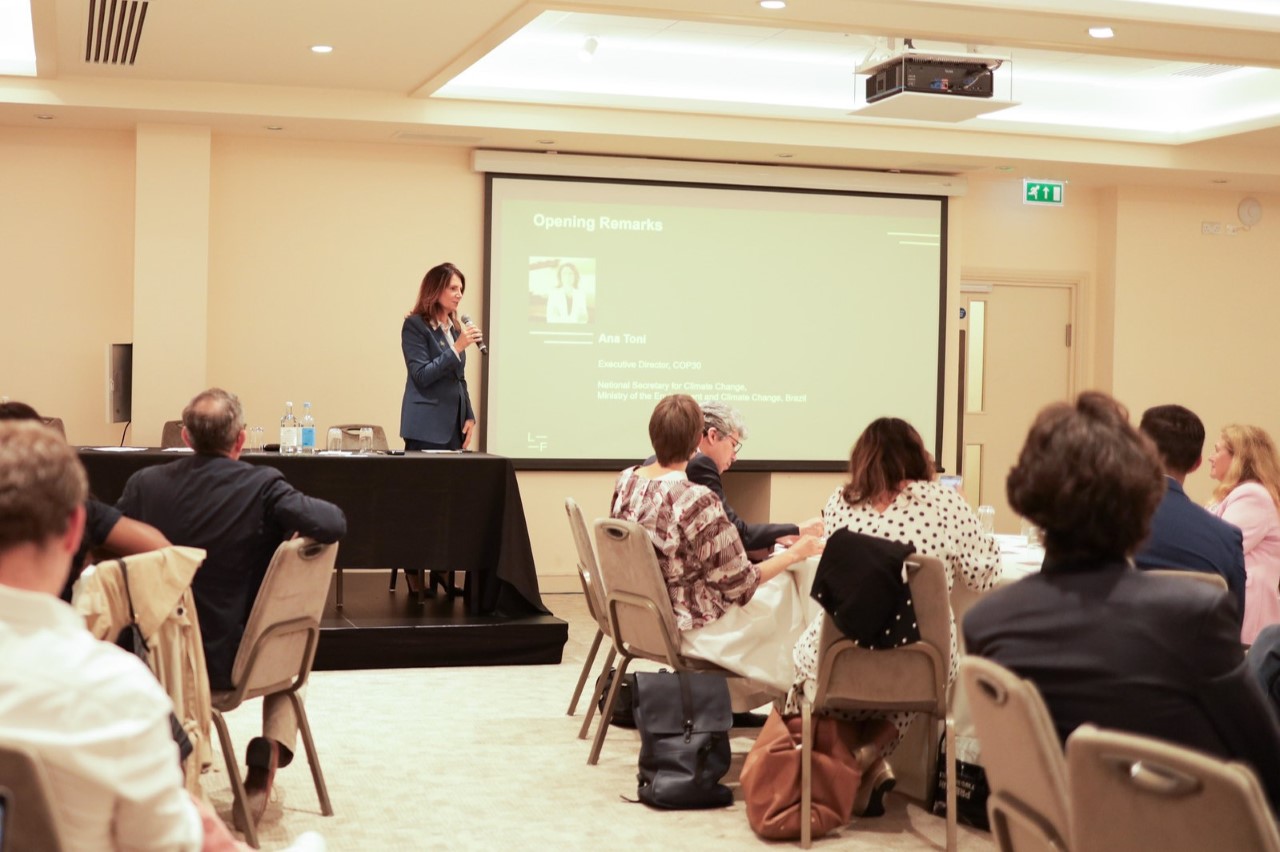Solutions to prepare workers for a just transition are the subject of a debate in London
During the event, attended by international experts and authorities, one message was clear: a just transition hinges on social justice and preparing people to participate in the new economy

By Franciéli Barcellos de Moraes | COP30
What pathways lead to a new economy — one that is environmentally sustainable and fair to workers, and people-centric? This was the guiding question of the "Jobs and Skills for a New Economy: Building an Action Agenda" debate on Wednesday, June 25, during which COP30 CEO Ana Toni presented. Ms. Toni underscored the importance of prioritizing green job creation and workforce training in Nationally Determined Contributions (NDCs).
"We need to recognize that this discussion is still limited," said Ms. Toni. "Few people are talking about this issue, and many don't even know what green jobs are. Highlighting these individuals — these workers — is pivotal to ensuring they have a voice and can speak for themselves.” She added that it’s essential to dispel the notion that green jobs are a luxury, recalling a recent statement from Brazilian President Luiz Inácio Lula da Silva: "If we don't bring the climate transition to our workers, we are not talking about the economy of the future."
As part of London Climate Action Week, experts, government representatives, non-governmental organizations (NGOs), the private sector, and international institutions gathered to discuss including both formal and informal workers in green economy solutions. According to experts, while sectors such as energy, transportation, and agriculture are setting emission-reduction targets, there has been little discussion about who will implement them. The absence of an institutional 'leader' for the workforce qualification agenda reveals a governance gap that must be addressed."
Discussions also underscored the pivotal role of the private sector and the fact that a green transition cannot occur in isolation. It is intertwined with forces such as geopolitical tensions, demographic growth, and technological revolutions. For this reason, it is important to view COP30 not as an endpoint, but as an opportunity to make tangible commitments and take ongoing action.
Other contributions
Efrem Bycer, Director of Climate and Workforce Partnerships at LinkedIn, noted that, according to the LinkedIn Green Skills Report, only one in six workers worldwide currently possesses sustainability-related skills, such as carbon management or renewable energy. This report guided the discussions. Mr. Bycer also noted that the demand for these skills, as measured by job postings requiring environmental knowledge, is growing twice as fast as the supply of qualified professionals. "This represents opportunity, but also the risk of not meeting market needs," he warned.
The report revealed that, despite its critical role in enabling the ecological transition, the financial sector has the lowest concentration of workers with "green skills." "If we don't train this sector, we won't unlock the USD 1.3 trillion needed annually to address climate change," he stated.
Systemiq Executive Director Liesbet Steer criticized the lack of intentional strategies to train workers for the green transition. "Countries plan decarbonization, but they ignore the labor market impacts," she emphasized. “We need robust data systems to forecast skill demands and prevent crises."
Ms. Steer noted that, despite the need, current funding is insufficient to address the urgency. "Climate finance goes toward physical infrastructure, while human capital is left behind," she said. She proposed engaging the private sector in blended financing models, as companies stand to benefit most from a skilled workforce.
Proposed pathways:
Intentionality in policies and governance – Incorporate skills and labor market needs into climate and industrial policies, with greater coordination between governments and sectors.
Innovation in skills programs and social adjustment — Expand work- and community-based learning models, modernize curricula, and adopt technologies that make programs more accessible and effective.
Investment in people — Mobilize financial resources, create incentives and involve the private sector in financing retraining.
London Climate Action Week Section
London Climate Action Week (LCAW) is an annual initiative that unites a diverse group of global stakeholders, including governments, businesses, non-governmental organizations (NGOs), academic institutions, and civil society, to promote practical and collaborative solutions to the climate crisis.
The agenda, one of the biggest on the international climate calendar, will be held this year from June 21 to 29.It serves as another event, even if it is not part of the official calendar of the United Nations Framework Convention on Climate Change (UNFCCC), to qualify the debates on the subject before COP30.
